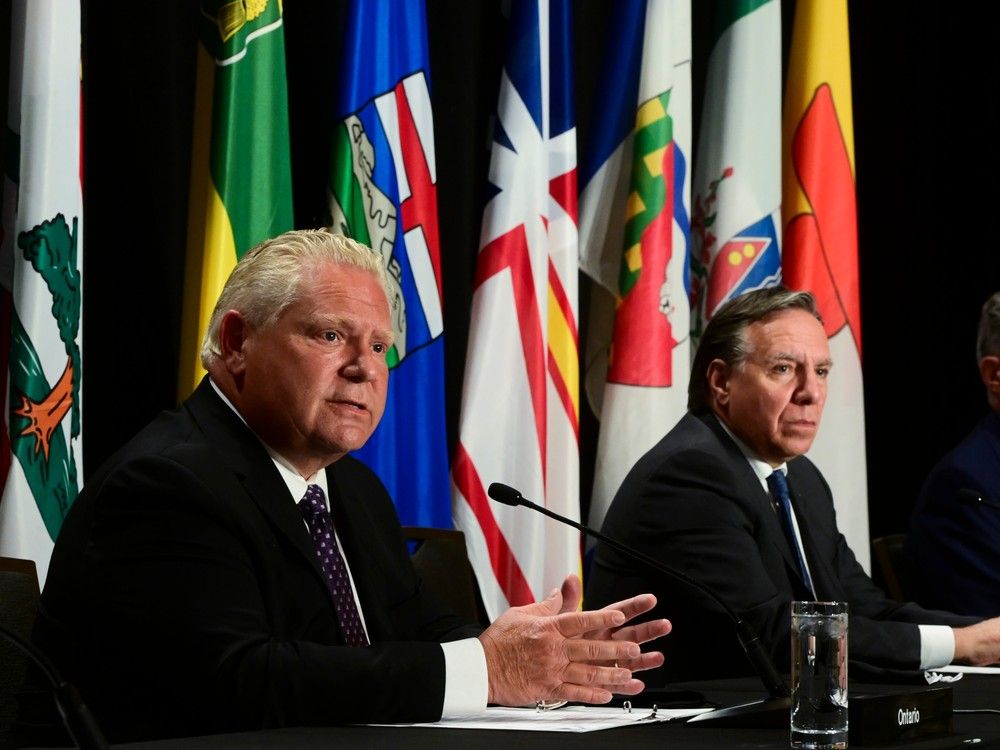[ad_1]
How Ditchburn and Breton Showed Us the Power of Collaboration: A Look at Canada’s First Ministers
Breadcrumb Trail Links
Good leadership that leaves a positive legacy sometimes means making decisions that don’t give you a boost in the political polls.
In this file photo, Ontario Premier Doug Ford, left, and Quebec Premier Francois Legault speak to the media. Aside from the immense public health challenge, a growing number of policy issues require a coordinated national response. Photo by Sean Kilpatrick / The Canadian Press
content of the article
While we’re all trying to find a silver lining to a traumatic pandemic, one small change sparked by the urgency of the moment might give Canadians hope: The Premiers got to know each other better — a lot better.
advertising 2
This ad has not yet loaded, but your article continues below.
SIGN UP TO UNLOCK MORE ARTICLES
Create an account or log in to continue your reading experience.
- Access items from across Canada with one account
- Share your thoughts and join the discussion in the comments
- Enjoy additional articles per month
- Receive email updates from your favorite authors
content of the article
Let’s hope the sense of urgency and momentum to work together remain as first ministers prepare to meet on Tuesday to negotiate a health deal. For a brief period, the pandemic offered a perspective of what they could accomplish together — and with First Nations, Métis, and Inuit leaders and mayors. They smashed a few eggs, upset some stakeholders, but over the course of the process we’ve made important advances like virtual healthcare.
By clicking the subscribe button, you agree to receive the above newsletter from Postmedia Network Inc. You can unsubscribe at any time by clicking on the unsubscribe link at the bottom of our emails or any newsletter. Postmedia Network Inc | 365 Bloor Street East, Toronto, Ontario, M4W 3L4 | 416-383-2300
Thanks for registering!
content of the article
But the pandemic has also drawn back the curtain on how our complex federation can be a barrier to nimbleness and adaptability. Bureaucracy. barriers. Overlapping programs and policies. Rigid organizational structures. Once again, creativity and pragmatism are needed to find modern solutions to the health crisis Canada is facing.
advertising 3
This ad has not yet loaded, but your article continues below.
content of the article
In addition to the immense public health challenge, there is a growing number of complex political issues that require a coordinated response from the country. Enhancing climate resilience, helping workers and communities adapt to a global low-carbon transition, determining the energy mix we need to achieve net-zero, responding to labor shortages – the list is long and there is much overlap in responsibilities. While the tools and levers employed may not be the same in every province, territory or indigenous nation, a high degree of cooperation and goodwill is required.
The first ministers already seem to have recognized that operating in silos does not work when dealing with massive modern problems. Data sharing is reportedly one of the points they hope to reach an agreement on. At the IRPP Center of Excellence for the Canadian Federation, we heard anecdotes from provincial and federal officials that they regularly consult our stringency index to compare COVID responses because no one else was collecting it nationally. Of course, there are far worse data gaps when trying to compare public policy issues across provinces. Without these critical data points, it’s impossible to know what really works and what doesn’t.
advertising 4
This ad has not yet loaded, but your article continues below.
content of the article
And yet there is a real danger that our governments will continue to alienate themselves. Polling data from the Confederation of Tomorrow project shows that resentment among citizens in certain provinces is mounting, as is resentment against the federal government. Some politicians may try to exploit these sentiments for their own benefit.
Good leadership that creates a positive legacy sometimes means making decisions that don’t give you a boost in the political polls. The first ministerial meeting this week could prove historic in terms of a health deal, but it will take courage from the assembled group to think nationally and work together. If the occasional slipping into each other’s DMs contributes to their common goal, that’s a good thing.
Jennifer Ditchburn is President and CEO of the Institute for Research on Public Policy (IRPP). Karl Breton is the Executive Director of the IRPP Center of Excellence for the Canadian Federation.
-
Pipe and Halayko: Why didn’t Ontario and Manitoba increase taxes on vape products?
-
Today’s letters: The appointment of Amira Elghawaby is not intended to make people comfortable
Share this article on your social network
Display 1
This ad has not yet loaded, but your article continues below.
Comments
Postmedia strives to maintain a lively but civilized discussion forum and encourages all readers to share their opinions on our articles. Comments may take up to an hour to be moderated before they appear on the site. We ask that you keep your comments relevant and respectful. We’ve turned on email notifications – you’ll now receive an email when you get a reply to your comment, there’s an update on a comment thread you follow, or when a user you follow comments follows. For more information and details on how to customize your email settings, see our Community Guidelines.
[ad_2]
Don’t miss interesting posts on Famousbio










